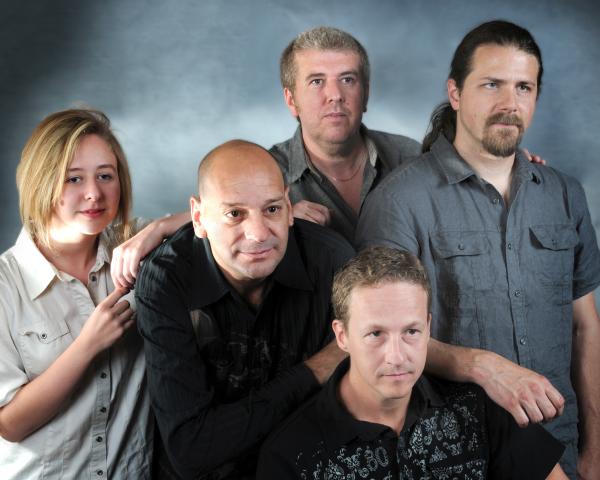|
Interview Simon Caron (Red Sand) “The music business is filled with rotten apples, but fortunately some good things happen as well” (October 2012, text by Henri Strik, edited by Peter Willemsen, pictures courtesy of Simon Caron) Recently the Canadian progressive rock band Red Sand released their fifth album Behind The Mask (see review). I like that record a lot and it made me curious to know more about this fine band. So I asked their founding member Simon Caron to tell the readers of Background Magazine a bit more about this release and the history of the band.
Would you please tell us briefly about the origin of the band and what bands or music were influential? Simon Caron: “Red Sand was formed in 2004 on the south shore of Quebec, Canada. Initially I needed musicians of course, and so after a few phone calls I'd found the musicians to start the rehearsals with. The only problem was the keyboardist, but that was quickly solved, since Stéphane Desbiens offered me to play the keyboards. So that's how Red Sand was formed.”Does the name Red Sand have any special meaning and who designed the band's logo? “The name has been conceived by Michel Bilodeau who loved the British band Camel, so he suggested Red Sand. I designed the logo that was inspired by Camel and Marillion. ”Many people regard Red Sand to be a Marillion clone. What's your opinion of that statement? “I find this statement a bit sad. Of course, on the first listen you certainly hear some elements of Marillion. However, have people who state that done the same by comparing the first era of Marillion to Genesis? I respect Marillion for what they did, but I didn't want to be a clone of them or any other band.”Why did you release a remastered version of your debut Mirror Of Insanity (2004) and the second album Gentry (2005)? “I wasn't happy with the initial sound on these albums.”Do these albums both have a musical concept? “Yes, the first one denounces children's abuse and the second one all government control of our society. If governments would leave us more freedom, the earth would be a much better place to live on. We're constantly managed by applicable laws that are often unnecessary and in some cases even misapplied. All that matters for them is our money, because they've never had the courage to be responsible and stop excessive spending.”
After the release of your debut Mirror Of Insanity three out of five band members were replaced by singer Steff Dorval, keyboardist Pierre Massicotte and bassist Mathieu Gosselin? What happened? “Our original singer Hëmel wasn't always available for the band, so it was important to find a singer who could spend more time for Red Sand and therefore Steff Dorval joined the band. As I said before Stéphane Desbiens wasn't a real band member. Eventually I found keyboardist Pierre Massicotte, but he didn't want to get involved as a member of Red Sand either, which is a shame. With our bassist Ian Côté we made several studio sessions together, but his wife suffered from illness and of course he had to deal with that. Mathieu Gosselin was recommended to me by Michel Bilodeau. It's rather funny since Mathieu lives two blocks from my house! He's a great acquisition for Red Sand.”It seemed that you couldn't find a new keyboardist for the recordings of the third album Human Trafficking. So you decided to play keyboards yourself. Or was it for another reason? “It's not exactly that. I decided to play the keyboards for this album and I really enjoyed the experience.”Do you see yourself as a guitar player, keyboard player, producer, composer or a bit of everything? “Well, I'm a guitarist in the first place, but I enjoy getting involved in all aspects of playing and recording. I'm rather curious, I may as well have played the drums, the keyboards or the flute, but I prefer to let the instruments to those who are paid to play on it. However, each album is a learning curve for me.”Would you please tell us something about the concept of Human Trafficking? “I'm a lover of movies and at the time we wanted to record a new album the movie Human Traffic came out. At the sight of this film I had the urge to vomit, but the taste to make an album that would speak of this world of sexually obsessed people and paedophiles around us. This album condemns this global scourge.”
On the next album Music For Sharks bass player Mathieu Gosselin played the keyboards. Also Hëmel returned on lead vocals. Would you please explain this? “Mathieu offered me to record the new CD on which he would like to play the keyboards, and I accepted that offer immediately. The return of Hëmel was only due to this occasion, but his presence was for a short period.”Is it true that the concept of the album is about the music industry? “Of course, the music business is filled with rotten apples, but fortunately some good happen as well. I experienced some situations that challenged me to write this album. However, I won't dwell upon the subject.”How do you look back at the recording and the release of the DVD Live Au Cabaret Du Liquor Store? “I think the first three albums are showing Red Sand after denouncing the injustices of life. So I wanted to record this show and to share it with the people who will probably never see a Red Sand concert. I got a lot of e-mails from people asking whether I was planning a European tour. Well, I don't because it's very expensive, so this DVD is a present for all our European fans.”
The new album Behind The Mask sees the return of singer Steff Dorval, but long-time member drummer Perry Angelillo has been replaced by D. Robertson. Would you please explain that? “It's simple, really. Perry wasn't available on the dates of the studio sessions, so I needed another drummer. Danny Robertson is the drummer of Mathieu's band.”Does the new album Behind The Mask has a musical concept either? “Yes, this is the story of a Jewish man from Hitler's era who sees his family disappear before his eyes. He escapes but he promises that he would take revenge. He does it rather rudely by torturing a German Nazi and throughout the story he tries to find out what's behind the mask. Everyone has his own personality. Some people have a dark side sleeping deep inside, but what happens if by any chance this dark side comes to the surface? They might become another personality.”The track list has only six songs, but if you play the album you'll hear an additional instrumental piece, a kind of happy ending tune to finish off the album. Why did you include this track without mentioning it on the track list? “It's an additional instrumental part of Veil Of Insanity.”Your daughter Pennsylia designed the front cover and played piano and keyboards on the new album. Would you tell us a bit about this young talent? “Pennsylia is a virtuoso pianist; she'll study at the Quebec Conservatory of Music by next autumn. She will also keep playing the piano on the next CD and continue drawing my album covers. I'm very proud of her.”What about Barbara another daughter of yours who designed the back of the album? “Barbara is talented as well. She's very good on drums, but at the moment she doesn't take it all too seriously. She also performs in drawing.”Pennsylia recorded an instrumental CD. Does this album also contain progressive rock music? “Her album integrates various styles of music. Pennsylia likes Jean Michel Jarre a lot. One song on the album is inspired by him. She writes compositions for a new CD now, but it will be much more commercial rock. It is promising, however.”All your albums are private releases. Is there a reason why you release them yourself and not by a record company? “I had some experiences with a record company and I prefer to manage that by myself.”
Do you have sponsors to finance your recordings and album releases? “No, it's me who pays for the printing of the CD and for the musicians. I like it this way. The more people you do business with, the more complicated it becomes. I've been working with some other bands and there was always someone else who shuffled the cards. Well, this way I can do what I want and do what I like.”In which part of the world does Red Sand have the most fans? “In Europe, actually; it sounds rather strange but Quebec is the most difficult part of the market for me to get fans. People don't even want to listen to you. Maybe you were told that Quebec is a city of prog rock. That may be true, but not if you come from the area. People will pay for foreign bands, but not for Red Sand.”Is it difficult for Red Sand to perform live? How did you manage to become the support of bands as Van Der Graaf Generator or Saga? “It's very difficult to perform. We would like to play in Europe, but the lack of contacts and money are the problems. I get lots of e-mails to play at home, but we expect an invitation. The only opportunity for us to get known in Quebec is by playing as a support act for big names. We had the chance to play with Saga and we have been surprised with a standing ovation in front of an audience of nearly six-hundred people. It was wonderful because nobody was familiar with Red Sand. As a support act for Van Der Graaf Generator we received an extraordinary reception as well.”What's the current live and studio line-up of Red Sand? Does your daughter Pennsylia go on tour with her father? “For now my daughter is studying, she wants to become a doctor, but yes she will play some music with us eventually. My live keyboard player is Nicolas Dusseault; he has been with us for three years now.”Will Red Sand ever perform in Europe and when will the next album be released? “We would like you to visit Europe and we expect invitations for live shows. The next CD is due for May 2013. It's called Cinema Du Vieux Cartier, an album devoted to the world of movies.”Simon, thank you for answering my questions! “A big thank to you and to all the fans of Red Sand in your area.”Red Sand Website MySpace review 'Music For Sharks' review 'Behind The Mask' |

